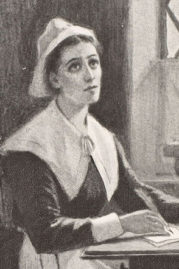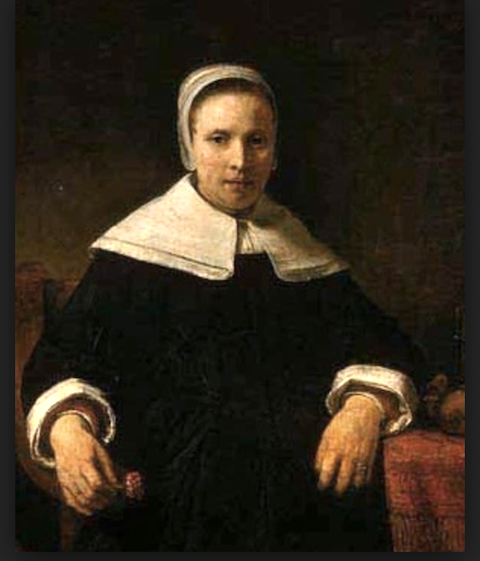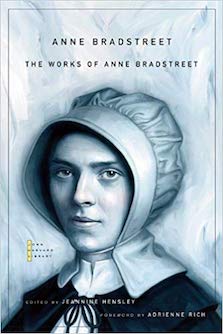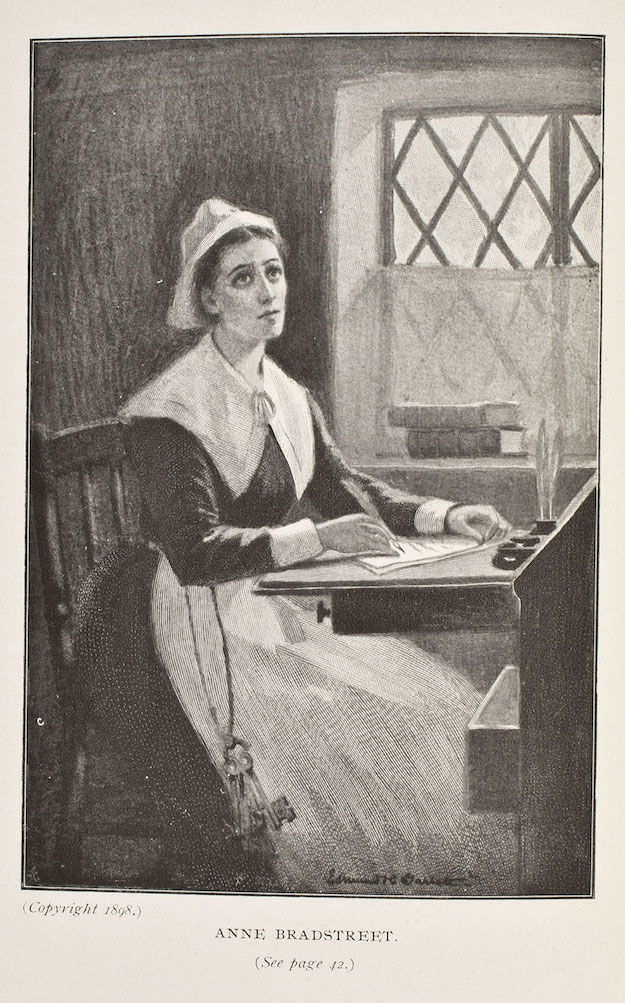5 Poems by Anne Bradstreet, Colonial American Poet
By Nava Atlas | On August 19, 2018 | Updated December 23, 2020 | Comments (0)

Anne Bradstreet (1612 – 1672) was one of the most prominent early American poets, and the first writer in the American colonies to be published. Following is a selection of five poems by Anne Bradstreet, most written in the 1650s and 1660s.
At a time when it was considered unacceptable for women to write, Anne rejected the prevailing ideas of women’s inferiority. She endured criticism, not for the quality of her work, but that she, a woman, dared to write.
The Tenth Muse Lately Sprung Up in America (1650) was her first volume of poetry, first published in London and favorably received.
Published under the pseudonym “A Gentlewoman from Those Parts,” this collection, like Anne Bradstreet’s subsequent work, reflected the duties of a Puritan woman to God, home, and family. She did so skillfully, and occasionally allowed notes of cynicism to creep in — perhaps the only form of rebellion possible for a woman of her time. For example: “I am obnoxious to each carping tongue / That says my hand a needle better fits.”
The following poems are included in this post. For further reading, see this general analysis of Anne Bradstreet’s poetry.
- To My Dear and Loving Husband
- The Author to Her Book
- Before the Birth of One of Her Children
- In Memory of My Dear Grandchild Elizabeth Bradstreet
- In Reference to Her Children, 23 June 1659
. . . . . . . . . .
To My Dear and Loving Husband
If ever two were one, then surely we.
If ever man were lov’d by wife, then thee;
If ever wife was happy in a man,
Compare with me ye women if you can.
I prize thy love more than whole Mines of Gold,
Or all the riches that the East doth hold.
My love is such that Rivers cannot quench,
Nor ought but love from thee, give recompense.
Thy love is such I can no way repay,
The heavens reward thee manifold I pray.
Then while we live, in love lets so persevere,
That when we live no more, we may live ever.
. . . . . . . . . .
The Author to Her Book
Thou ill-formed offspring of my feeble brain,
Who after birth did’st by my side remain,
Till snatched from thence by friends, less wise than true,
Who thee abroad, exposed to public view,
Made thee in rags, halting to th’ press to trudge,
Where errors were not lessened (all may judge).
At thy return my blushing was not small,
My rambling brat (in print) should mother call.
I cast thee by as one unfit for light,
Thy visage was so irksome in my sight;
Yet being mine own, at length affection would
Thy blemishes amend, if so I could:
I washed thy face, but more defects I saw,
And rubbing off a spot still made a flaw.
I stretched thy joints to make thee even feet,
Yet still thou run’st more hobbling than is meet;
In better dress to trim thee was my mind,
But nought save homespun cloth, i’ th’ house I find.
In this array ‘mongst Vulgars may’st thou roam.
In critic’s hands beware thou dost not come,
And take thy way where yet thou art not known;
If for thy Father asked, say thou hadst none;
And for thy Mother, she alas is poor,
Which caused her thus to send thee out of door.
. . . . . . . . . .
The only existent portrait of Anne Bradstreet
Learn more about Anne Bradstreet
. . . . . . . . . .
Before the Birth of One of Her Children
All things within this fading world hath end,
Adversity doth still our joys attend;
No ties so strong, no friends so dear and sweet,
But with death’s parting blow is sure to meet.
The sentence past is most irrevocable,
A common thing, yet oh, inevitable.
How soon, my Dear, death may my steps attend.
How soon’t may be thy lot to lose thy friend,
We both are ignorant, yet love bids me
These farewell lines to recommend to thee,
That when that knot’s untied that made us one,
I may seem thine, who in effect am none.
And if I see not half my days that’s due,
What nature would, God grant to yours and you;
The many faults that well you know
I have Let be interred in my oblivious grave;
If any worth or virtue were in me,
Let that live freshly in thy memory
And when thou feel’st no grief, as I no harms,
Yet love thy dead, who long lay in thine arms.
And when thy loss shall be repaid with gains
Look to my little babes, my dear remains.
And if thou love thyself, or loved’st me,
These O protect from step-dame’s injury.
And if chance to thine eyes shall bring this verse,
With some sad sighs honour my absent hearse;
And kiss this paper for thy love’s dear sake,
Who with salt tears this last farewell did take.
. . . . . . . . . .
The Works of Anne Bradstreet on Bookshop.org*
Anne Bradstreet page on Amazon*
. . . . . . . . . .
In Memory of My Dear Grandchild Elizabeth Bradstreet
Who Deceased August, 1665 Being a Year and a Half Old
Farewell dear babe, my heart’s too much content,
Farewell sweet babe, the pleasure of mine eye,
Farewell fair flower that for a space was lent,
Then ta’en away unto eternity.
Blest babe why should I once bewail thy fate,
Or sigh the days so soon were terminate;
Sith thou art settled in an everlasting state.
By nature trees do rot when they are grown.
And plums and apples thoroughly ripe do fall,
And corn and grass are in their season mown,
And time brings down what is both strong and tall.
But plants new set to be eradicate,
And buds new blown, to have so short a date,
Is by His hand alone that guides nature and fate.
. . . . . . . . . .
In Reference to Her Children, 23 June 1659
I had eight birds hatched in one nest,
Four cocks there were, and hens the rest.
I nursed them up with pain and care,
Nor cost, nor labour did I spare,
Till at the last they felt their wing,
Mounted the trees, and learned to sing;
Chief of the brood then took his flight
To regions far and left me quite.
My mournful chirps I after send,
Till he return, or I do end:
Leave not thy nest, thy dam and sire,
Fly back and sing amidst this choir.
My second bird did take her flight,
And with her mate flew out of sight;
Southward they both their course did bend,
And seasons twain they there did spend,
Till after blown by southern gales,
They norward steered with filled sails.
A prettier bird was no where seen,
Along the beach among the treen.
I have a third of colour white,
On whom I placed no small delight;
Coupled with mate loving and true,
Hath also bid her dam adieu;
And where Aurora first appears,
She now hath perched to spend her years.
One to the academy flew
To chat among that learned crew;
Ambition moves still in his breast
That he might chant above the rest
Striving for more than to do well,
That nightingales he might excel.
My fifth, whose down is yet scarce gone,
Is ‘mongst the shrubs and bushes flown,
And as his wings increase in strength,
On higher boughs he’ll perch at length.
My other three still with me nest,
Until they’re grown, then as the rest,
Or here or there they’ll take their flight,
As is ordained, so shall they light.
If birds could weep, then would my tears
Let others know what are my fears
Lest this my brood some harm should catch,
And be surprised for want of watch,
Whilst pecking corn and void of care,
They fall un’wares in fowler’s snare,
Or whilst on trees they sit and sing,
Some untoward boy at them do fling,
Or whilst allured with bell and glass,
The net be spread, and caught, alas.
Or lest by lime-twigs they be foiled,
Or by some greedy hawks be spoiled.
O would my young, ye saw my breast,
And knew what thoughts there sadly rest,
Great was my pain when I you fed,
Long did I keep you soft and warm,
And with my wings kept off all harm,
My cares are more and fears than ever,
My throbs such now as ‘fore were never.
Alas, my birds, you wisdom want,
Of perils you are ignorant;
Oft times in grass, on trees, in flight,
Sore accidents on you may light.
O to your safety have an eye,
So happy may you live and die.
Meanwhile my days in tunes I’ll spend,
Till my weak lays with me shall end.
In shady woods I’ll sit and sing,
And things that past to mind I’ll bring.
Once young and pleasant, as are you,
But former toys (no joys) adieu.
My age I will not once lament,
But sing, my time so near is spent.
And from the top bough take my flight
Into a country beyond sight,
Where old ones instantly grow young,
And there with seraphims set song;
No seasons cold, nor storms they see;
But spring lasts to eternity.
When each of you shall in your nest
Among your young ones take your rest,
In chirping language, oft them tell,
You had a dam that loved you well,
That did what could be done for young,
And nursed you up till you were strong,
And ‘fore she once would let you fly,
She showed you joy and misery;
Taught what was good, and what was ill,
What would save life, and what would kill.
Thus gone, amongst you I may live,
And dead, yet speak, and counsel give:
Farewell, my birds, farewell adieu,
I happy am, if well with you.
. . . . . . . . . .
Anne Bradstreet, as later imagined in an 1898 book
. . . . . . . . . .
*These are Bookshop Affiliate and Amazon Affiliate links. If the product is purchased by linking through, Literary Ladies Guide receives a modest commission, which helps maintain our site and helps it to continue growing!



Leave a Reply